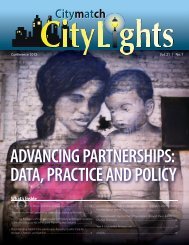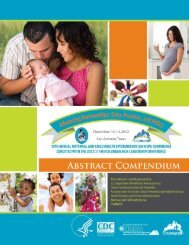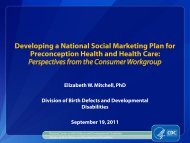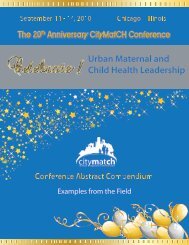Conference Abstract Compendium Examples from the ... - CityMatCH
Conference Abstract Compendium Examples from the ... - CityMatCH
Conference Abstract Compendium Examples from the ... - CityMatCH
Create successful ePaper yourself
Turn your PDF publications into a flip-book with our unique Google optimized e-Paper software.
2009 <strong>CityMatCH</strong> Urban MCH Leadership <strong>Conference</strong>likelihood in using highly effective contraceptives (p=.015); spirituality was not a significant predictor.Additionally, 24.34% of respondents indicated that at least one method of contraception was against <strong>the</strong>irreligious beliefs, although only 1.32% reported that <strong>the</strong>ir beliefs actually prevented <strong>the</strong>m <strong>from</strong> using acontraceptive method suggested by a provider. The majority of respondents, 58.20%, believed that <strong>the</strong>irreligious institution would be supportive of <strong>the</strong>ir family planning choices, although 24.60% indicated that<strong>the</strong>y would leave or switch <strong>the</strong>ir faith institution if <strong>the</strong>ir family planning choices were not supported (asopposed to not discussing choices publicly), indicating <strong>the</strong> importance of religious institutional support.LIMITATIONSThe study is limited by a relatively small sample size, comprised primarily of Christian women.CONCLUSIONS AND IMPLICATIONSReligion and faith play a mixed, but important role in <strong>the</strong> reproductive health decision making of lowincome,African-American women and should be considered when developing interventions. Religion canhave a two-pronged impact on reproductive health issues such as unintended pregnancy andcontraception. On an individual level, religious views and spirituality may influence a person or couple’sdecision-making about contraceptives, choices about when and how to have a family, and a myriad ofo<strong>the</strong>r health decisions faced on a daily basis. At <strong>the</strong> community level, faith institutions have <strong>the</strong> potentialto be very influential in areas of education, counseling, and establishing community norms – whe<strong>the</strong>r<strong>from</strong> <strong>the</strong> pulpit, in spoken values shared through adult education classes, or unspoken values sharedamong a religious community. Given <strong>the</strong> great importance of religion and spirituality to this population oflow-income, African-American women, incorporating faith values and institutions should be consideredin effective outreach programs.88







